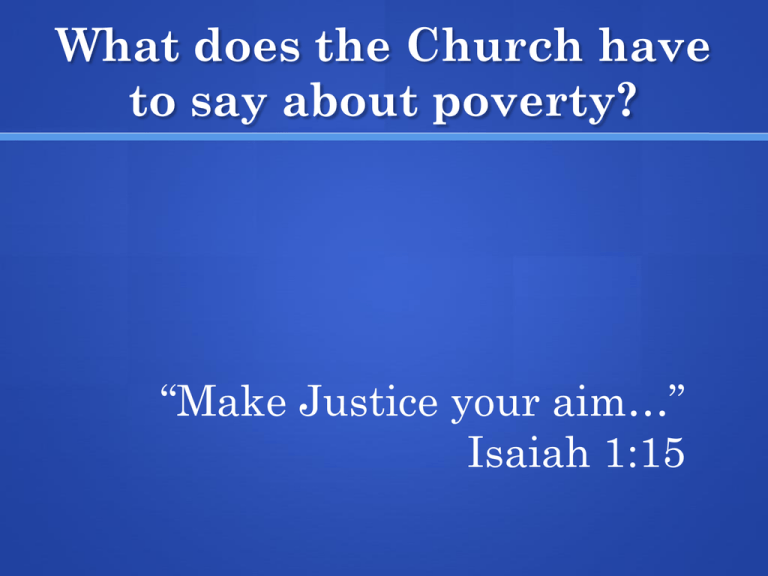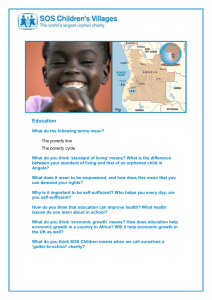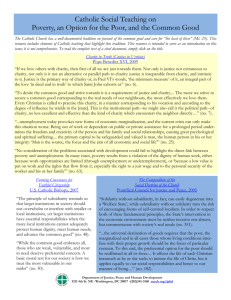What does the Church have to say about poverty?
advertisement

What does the Church have to say about poverty? “Make Justice your aim…” Isaiah 1:15 Tonight’s journey… 1. Poverty today: The Reality 2. Catholic Social Teaching (CST): History and Context 3. CST in Action: Individuals and groups standing on two feet. Pop Quiz: Poverty in the USA 1. In 2009, how many people were in poverty in the U.S.? a. 10.4 million b. 25.3 million c. 38.7 million d. 43.6 million Answer: D. In 2009, 43.6 million people were in poverty, 14.3% of the population. Pop Quiz: Poverty in the USA 2. True or False: The number of families in poverty is decreasing. Answer: False. The number of families in poverty is increasing. In 2009, 8.8 million families lived in poverty (11.1% of the population). Compare that to 2008, where 8.15 million families lived in poverty (10.3%). In 2007, 7.62 million families lived in poverty. Pop Quiz: Poverty in the USA 3. True or False: According to the U.S. government, a family of four—two adults and two children—is poor if it earns less than $35,000 annually. Answer: False. The federal “poverty threshold” in 2009 for a family of four with two children 17 or younger is $ 21,834. However, a majority of Americans believe it takes at least $35,000 annually to provide adequately for a family of four. (Source: Poverty Pulse poll, 2000) Pop Quiz: Poverty in the USA 4. True or False: The federal minimum wage is $5.85 per hour. Not on minimum wage… Answer: False. The federal minimum wage became $7.25 per hour July 24, 2009. A single parent with one child working at this minimum wage full-time every week of the year ($7.25 x 40 hours x 52 weeks) would earn $15,080 before any deductions or taxes—$240 above the poverty threshold of $14,840. Pop Quiz: Poverty in the USA 5. In 2009, what percentage of children under 18 were in poverty? a. 10.8% b. 13.3% c. 17.9% d. 20.7% Answer: D. In 2009, more than 1 out of every 5 children was in poverty (15.5 million kids). Reactions? Write down a few quick thoughts: Which question caught your attention/surprised you? Did any of these facts anger/sadden/confuse you? Turn to a person near you and share. Headline thoughts for the large group? Poverty is real. How do we as people of faith respond? With Justice. Write down your definition of justice. What influenced your definition? Share with the person next to you. The Church responds… …with justice rooted in Scripture: “Make justice your aim: redress the wronged, hear the orphan's plea, defend the widow.” (Isaiah 1:15) “You have been told, O man, what is good, and what the LORD requires of you: Only to do the right and to love goodness, and to walk humbly with your God.” (Micah 6:8) “Which of these three, in your opinion, was neighbor to the robbers' victim?” He answered, "The one who treated him with mercy." Jesus said to him, "Go and do likewise.” (Luke 10:34) The Church’s Response Based on Biblical Justice •Not about straight correlations (“this” for “that”) •About making things right Right relationship with… God One another Creation Not blind…we see those suffering injustice and act. The Lingo Catholic Social Tradition—Living of justice. Catholic Social Thought—Reflection on justice. Catholic Social Teaching—Teaching on justice. “Make Justice your aim…” Catholic Social Tradition •Brings in the whole history of people, places, events & movements following the call of Scripture. •Church’s lived and intellectual tradition, broadly speaking. •People: Dorothy Day, Thea Bowman, John Ryan •Movements: Catholic Worker •Catholic Social Tradition: Christians living out lives of justice. Catholic Social Thought Patristic and Classical theologians Augustine Aquinas Continuing reflection today Liberation Theology Eco-theology Catholic Social Thought: Christians reflecting what it means and how to live just lives. Catholic Social Teaching The official teachings of the Magisterium Papal encyclicals: •1891: Leo XII Rerum Novarum “On the Condition of Labor” to 2009: Benedict XVI Caritas in Veritate Bishops Conferences: •U.S.: The Challenge of Peace and Economic Justice for All (1986) •CELAM (Central American Bishops): Puebla (1979)—the Preferential Option for the Poor Local Bishops: •Bishop of Gary: “Created in God’s Image” pastoral letter on racism (1993) •U.S. Bishops in the Northwest: Pastoral letter on Colombia River The Church’s Social Doctrine Catholic Social Teaching offers wisdom about building a just society and living lives of holiness amidst the challenges of modern society. Coherence through the years: “The Church’s social doctrine illuminates with an unchanging light the new problems that are constantly emerging.” (CV, 12) Not old and outdated, but relevant and applicable to today’s issues. CST Values and Principles for Action Dignity of the Human Person Community and the Common Good Rights and Responsibilities Option for the Poor Dignity of Work Solidarity Care for God’s Creation Principles of Catholic Social Teaching CST Solar System Common Good Rights and Responsib ilities Care for God’s Creation Human Dignity Option for the Poor Solidarity Dignity of Work Principles = basis for all of Catholic social teaching. Issues may change, but these principles are immutable. They help us aim for justice in our lives and the world. Everything centers on Human Dignity, and all are interconnected. Human Dignity Cornerstone of CST Humans are created imago Dei All human life is sacred— from conception to natural death and everywhere in between. Dt 30:15-20—”Choose life that you may live.” Eph 4:23-24—”…put on the new self, created in God's way in righteousness and holiness of truth.” Human dignity comes from who one is, not from what one does. Community & the Common Good Human persons are called to be social. Model: Mystery of God’s Trinitarian relationship We recognize humanity in relationship to others; We are saved through community. Universal, not limited by borders. Lv 19:9-15—Treat your neighbor with justice and mercy. Jn 13:34-35—” …as I have loved you, so you also should love one another.” We are diminished by the suffering of others. Rights and Responsibilities Human dignity means that people’s basic rights are fulfilled. We are called to respect those rights. Having our rights is not the end; we have a responsibility to make it possible for others to achieve and exercise their own rights. Am 5:21-24—God desires not empty religious practice, but true work on behalf of justice. Mt 23:11—”The greatest among you must be your servant.” Rights come with responsibilities. Advocacy: Fulfilling our responsibility to work for the rights of others, especially the poor. ACTION ALERT Tell Congress to Help Poor and Unemployed Families Option for the Poor All people, especially the poor and the vulnerable, have a place at the table. Not “optional” but “option.” Ex) Parent & two kids. Ps 41:1-3—Show regard for the poor and lowly. Lk 4:16-30—Jesus mission: glad tidings to the poor, liberty to captives, sight to the blind, freedom to those oppressed. o“The obligation to provide justice for all means that the poor have the single most urgent economic claim on the conscience of the nation.” (Economic Justice for All) Dignity of Work We are called to our vocation to be participate through work in God’s act of creation. Everyone has a right to fair and decent work in which their dignity is respected (safe conditions, fair wage, etc) Is 3:13—Do not grind the face of the poor. Jas 5:1-6— “…the wages you withheld from the workers who harvested your fields are crying aloud…” The misery of unjust wealth. CCHD has provided nearly 8,000 grants to self-help organizations led by poor persons. Solidarity We are all part of one increasingly interconnected global family—regardless of class, race or geographic differences. Loving our neighbors has global dimensions. Is 32:16– “Justice will bring about peace” Mt 25:31-46—Christ identifies with all people who suffer oBenedict XVI: Solidarity is being moved by charity to see our global partners not just as neighbors but as our brothers and sisters. (CV, 19) Care for God’s Creation Genesis teaches us that all creation is holy and a gift from God. We are co-creators with God and thus must be good stewards of creation. Cardinal Sheehan School, MD Gen 2:15— “The LORD God then took the man and settled him in the garden of Eden, to cultivate and care for it.” Rom 8:18-25—All creation awaits redemption. Mt 6:25-34—Learn to trust in God as creation does. o“God destined the earth and all it contains for all people and nations so that all created things would be shared fairly by all humankind under the guidance of justice tempered by charity.” (GS, 69) Our CST sunglasses CST gives us a unique lens through which to view the world. We see things differently. Examples: poverty, the economy, our own choices. [Your face here] Themes in Caritas in Veritate Charity begins with justice. Charity is not simply individual action or irrelevant to structural reforms—“Justice is inseparable from Charity.” There is one social doctrine of the church. All of the principles of CST are united and interconnected. Authentic Human Development Essential quality is that it is “integral,” promoting the good of every person and the whole person (not just $$). There is a moral dimension to the economy. Economy needs a people-centered ethics to function properly. Every choice is a moral choice; no “givens.” Globalization is neither good nor bad; we must drive it toward the goal of human solidarity (by our choices). Thinking with CST “…every economic decision has a moral consequence.” (CV, 37) Budgets = moral documents October Gas/Oil Change Groceries Family Wedding Cable Charity Target Best Buy Insurance Loans Fri-Sat Nights 16% 16% 4% 8% 4% 20% 24% You’ve never met this person. What matters to him? 5% 1% 2% U.S. Federal Budget Strictly by observation what can we say “matters” according to this budget? (SPOILER ALERT: See the heading at the top) How might our CST sunglasses allow us to see alternative structures to our budget? What “givens” could we question? Source: Center for Budget and Policy Priorities Practical Ways of Living a Just Life Awareness: Justice Education Direct Service & Advocacy: For Others (“Two Feet”) Empowerment: With Others The Reality of Experience Cross your arms… Change is uncomfortable, unsettling. Your UP experience will be different—uncomfortable, perhaps unsettling. Arms crossed < UP experience < Structural Change Remember your CST shades! The Takeaway “If we love others with charity, then first of all we are just toward them.” (Caritas in Veritate, 6) CST = a unique way to view the our world. Wear your shades! Where is God in all of this suffering/injustice? Where is God in these people, this organization, this experience? The Sun of Justice “But for you who fear my name, there will arise the sun of justice with its healing rays…” (Mal 3:20) Until then… “Make Justice your aim…” Isaiah 1:15





